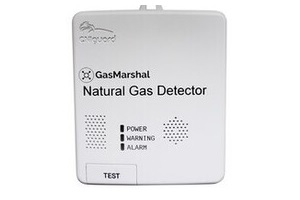Senet, CNIguard and Semtech deliver LoRaWAN natural gas leak detection and utility monitoring solutions

Senet, Inc., a provider of cloud-based software and services platforms that enable global connectivity and on-demand network build-outs for the Internet of Things (IoT), is collaborating with CNIguard and Semtech Corporation to deliver natural gas monitoring solutions to utilities across the United States.
Through this partnership, the companies are addressing the utility industry’s digitisation requirements by providing an intelligent network infrastructure designed to support a massive ecosystem of utility-centric LoRaWAN devices for gas safety and service delivery.
Starting with gas safety, the companies are collaborating to introduce a new version of CNIguard’s GasMarshal methane sensor which integrates Semtech’s LoRa® devices and the LoRaWAN® protocol. The CNIguard network-connected gas leak detection solution supports accurate, maintenance-free operation with service level agreements (SLAs) over 10 years due to the market leading power efficiency of its battery-operated devices.
CNIguard will also be integrating its solution with Senet’s LoRaWAN network the public SLA-backed carrier-grade LoRaWAN network in the United States. Offering extensive flexibility to utilities, Senet provides options for public, private and semi-private network deployment and network operation. The low total cost of ownership (TCO) delivered by the efficiencies of devices developed with the LoRaWAN protocol, coupled with flexible network deployment models, are enabling new levels of operational efficiency and rate payer affordability.
“We’re excited to be working with Senet and Semtech to develop sensor-enabled devices and solutions that will help modernise critical infrastructure, enhance safety and improve overall operational efficiency for utilities,” says Edward Klinger, CEO at CNIguard. “Our utility customers are investing in the technologies that will enable the next generation of energy systems and we view supporting the LoRaWAN protocol as a critical element of that process.”
Executing a collaborative go-to-market strategy, CNIguard, Senet and Semtech are engaged in field trials with large multi-utility service providers to explore use cases focused on improving safety levels and reliability across regional distribution networks. Extending value further, with a Senet network in place for gas leak detection, utilities can easily add network capacity and coverage to enhance operations and expand their service offerings to include other gas safety and service delivery solutions on the same IoT network.
“Senet has commercially deployed dense LoRaWAN networks in municipalities across the United States to support AMI for water metering and water management applications, and opportunities in the natural gas market are following close behind,” comments Bruce Chatterley, CEO at Senet.
“We look forward to a successful partnership with CNIguard in support of this growing market opportunity and are excited to be teamed with Semtech and CNIguard to deliver new levels of commercial and consumer safety through IoT connected solutions.”
“Carrier-grade network connectivity from Senet and highly reliable low-cost sensors based on the LoRaWAN protocol from CNIguard provide utilities with new models of control and the ability to drive their vision of automation and digitisation faster than ever before,” adds Marc Pegulu, VP of IoT product marketing at Semtech’s Wireless Sensing Business.
“With these solutions available today, utilities are in a unique position to become leading adopters of large scale IoT solutions that will have a lasting positive impact on the safety of citizens, the modernisation of municipal infrastructure, and resource conservation.”
According to the U.S. Energy Information Administration, nearly half of all homes in the United States use natural gas as their primary heat source and, although it may seem rare, the Pipeline and Hazardous Materials Safety Administration reports explosion accidents involving natural gas pipelines occur once every two days. Statistics from NFPA publications and reports from the National Transportation Safety Board (NTSB) show that most major gas incidents in the United States involve some type of leak, resulting in an average of 40 deaths, 140 civilian injuries and over $50 million (€41.33 million) in direct property damage per year.
For utilities, mitigating and ultimately eliminating these incidents and ensuring the safe, efficient, and environmentally sound distribution of natural gas to residential and commercial consumers is of paramount concern. In addition to enhancing consumer safety, these solutions assist utilities in supporting existing and expected legislative regulations focused on gas leak detection and remediation processes.
Comment on this article below or via Twitter @IoTGN
